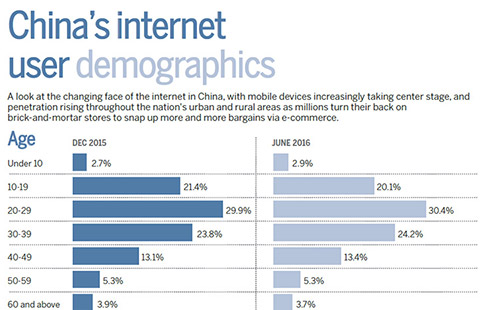Rescue efforts trigger unhealthy market expectations
Lu Tao can't sleep. He gets bouts of panic at night. And he is too afraid to tell his parents why.
The 23-year-old university student from Hangzhou, Zhejiang province in eastern China, has a stock-market problem.
He borrowed 200,000 yuan ($32,200) from his parents, piled the money into mainland shares without their permission, and got caught in the biggest sell-off in two decades.
At first, Lu considered liquidating his holdings and owning up to the losses. But now that the government has arrived to rescue the market, he has decided to bear the sleepless nights, keep his parents in the dark and stay invested.
"I won't exit," he said. "I still see value and I believe government policies will safeguard it."
Lu's unwavering faith in the policymakers illustrates the growing risk of moral hazard in the world's second-largest stock market, an unintended side effect of government efforts to halt a $3.9 trillion sell-off.
While the support measures have helped spark a 13 percent rally in the Shanghai Composite Index over the past few days, the risk is that investors come to view the market as a one-way bet-fueling bubbles that authorities may struggle to control.
"You don't want to give the market the impression that whenever it comes down, you'll be there," said Tai Hui, the Hong Kong-based chief Asia market strategist at JPMorgan Asset Management.
The moral hazard problem is particularly acute in China because authorities stepped in at a time when stock valuations were still expensive, said Francis Cheung, a strategist at CLSA Ltd in Hong Kong.
At 60, the median price-to-earnings ratio on mainland bourses is higher than in any of the world's 10 largest markets. The ratio was 68 at the peak of the mainland equity bubble in 2007, data compiled by Bloomberg show.
The Shanghai Composite dropped 1.16 percent on Tuesday.
"The government is in a dilemma," Cheung said.
"They promoted the market on its way up, and now that it has crashed, there are investor expectations that the government will rescue them."
Policymakers have gone to unprecedented lengths to prop up stocks. They banned large shareholders from selling stakes, ordered State-run institutions to buy equities, allowed the central bank to finance stock purchases and let more than half of companies on mainland exchanges halt trading.
Bulls are using the measures to justify investing in shares.
Chen Xiaofei, an investment adviser at Changjiang Securities Co in Shanghai, told margin-trading clients-some sitting on losses of as much as 60 percent-to stick with their positions because government support will lead to a rally.
"In China, once the government is acting, there's no difficulty we cannot get over," Chen said.
Of course, China is not the only country with a history of intervention in markets. The United States Securities and Exchange Commission temporarily banned short selling on some stocks during the global financial crisis seven years ago.
In China's market, however, not everyone is willing to wager on the rescue effort.
Meng Zhang, a university student studying human resources in the US, liquidated her holdings of mainland equities as the Shanghai Composite Index started to fall in June. She has no plans to re-enter the market, saying real estate is a better bet.
"There is no logic in the stock market," Meng said. "There's too much risk."
Still, pessimists may be the minority among China's 90 million individual investors, who drive more than 80 percent of trades on mainland bourses.
Fifty-four percent of those surveyed by CLSA predicted shares will rise in the next three months, while 66 percent said they expect the government to support the market. About 77 percent said they will maintain or boost holdings over the next month, CLSA wrote in a July 6 report.
"The bailout effort by the government is not cost-free," said Larry Hu, the head of China economics at Macquarie Securities Ltd in Hong Kong. "It might encourage more aggressive risk-taking."
Staying invested in Chinese shares has also been tough on Xing Peipeng, a client manager at a bank in Beijing. As he watched a year's worth of stock-market gains get erased in two weeks, the 23-year-old said he lost focus at work and was under so much stress at one point that his throat began to swell up.
Even after all that, Xing still has faith that stocks will rally.
"The government's series of measures will eventually take effect," he said. "I'm still confident in the market's future."






















